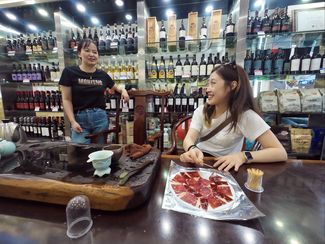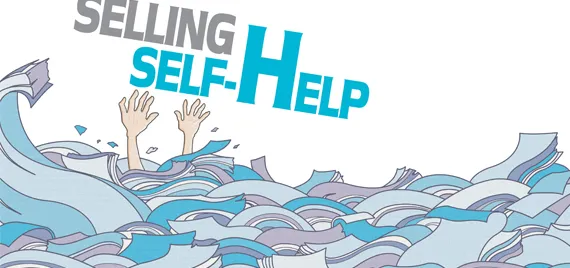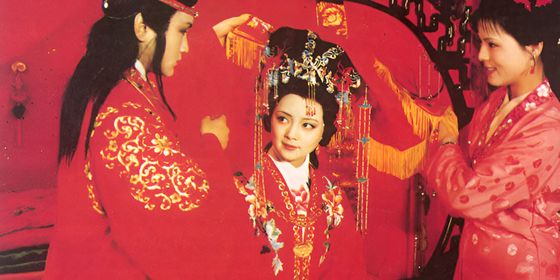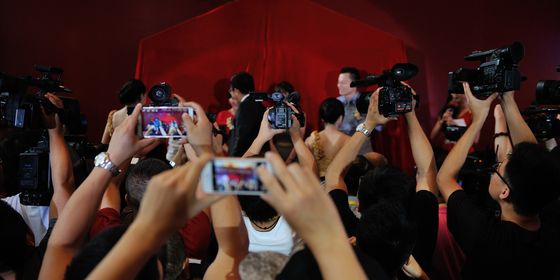The Chinese people’s obsession with self-help and the economy of selling success
In Legend of the Dragonslayer Sword (《倚天屠龙记》), a well-known kung fu romance set in the Ming Dynasty (1368-1644), protagonist Zhang Wuji is an average young man without good looks, talent, or great virtue. That is, until he accidentally gets hold of a secret book that teaches a rare, invincible form of kung fu. After five years of surreptitious practice, he goes on to defeat countless foes, becomes a leader, wins the love of beautiful women, and retires at the early age of just 22. The secret book was quite the find for young Zhang, and the myth of the magical book that solves all of your problems still persists today. In Beijing Book Plaza on Xidan Street, the biggest bookstore in China, the bestseller shelves are stocked almost entirely with self-help tomes to make you better, stronger, richer, and happier. More importantly though, they focus on people—how to convince people, manipulate them, deal with serpent-like colleagues, and improve your own personal charm, but all of these books still hearken back to the halcyon days of magic books—complete with images of authorities above suspicion.
US President Barack Obama’s smile adorns Learn How to Give Enthusiastic Speeches like Barack Obama; one series of books teaching communications skills has the word “FBI” in large letters on their cover, because, obviously, FBI agents are the best at brainwashing; Tim Roth pensively studies your face on Read Minds by Microexpressions, followed by the subtitle, “See through people, read their minds in the blink of an eye, and defeat your social opponents”; Margaret Thatcher sternly looks down on you from Speeches Given in the World’s Most Famous Universities that Will Affect Your Whole Life. Of course, if you’re not in the market for success, a few steps away from these Machiavellian captains of politics and industry is the benevolent Monk Xingyun (星云法师), rolling his Buddhist beads on To Live Is to Let Go (《活着就是放下》). Beware, however, because if you linger by the self-help book shelves for too long, men in black suits strolling idly around will detect your desperation and come and ask you: “Do you want a part-time job? I’m from Amway.”
With over one third of university graduates jobless when they graduate and the Gini coefficient that indicates the income inequality reaching as high as 0.74 in 2014, there are millions of Chinese young people looking for fast solutions to their bleak future, and, seemingly, self-help books are an important outlet.
The Chinese name for “self-help book” is 心灵鸡 汤, or “chicken soup for the soul”, which obviously is adopted from the well-known book series under the same name by Jack Canfield and Mark Hanson in the 1990s, whose translations were incredibly well-received in China. Today, “chicken soup” has developed into many subgenres: motivational “chicken soup”, women’s “chicken soup”, and trauma “chicken soup”.
“I read a lot of self-help books when I graduated from university,” says Peng Hui, a 32-year-old IT worker. “I was young then and needed motivation to work extra hard for a better life, and those books really worked. For a few days I really thought I became a better person. But it was just an illusion. The morals they preach—to keep a positive attitude, to socialize skillfully and build your network, and excel with others—are all infallible. It’s just that I would always go back to my old self.”
Just like the name “chicken soup” implies, self-help books for Chinese readers are largely imported and have been from the very beginning. The first in the self-help canon in China, and arguably the most influential of them all, was How to Win Friends and Influence People by Dale Carnegie. The book was first translated in 1938, but drew little attention at the time. Chinese people didn’t really discover their vast appetite for self-help books until a new version of the book appeared in 1986, under the title The Human Weakness (《人性的弱点》). On the cover it even boasted to be “the second bestseller in the publishing history of mankind” (the first presumably being the Bible). The sensationalist title, together with a new hunger for success created off of the back of the Reform and Opening Up, meant that by the early 1990s the book had become a huge success. For the next three decades, Dale Carnegie’s charismatic smile has been ubiquitous in Chinese bookstores, and his books remain the No. 1 bestseller of the genre on Dangdang.com, China’s biggest online bookstore. He is frequently referred to as “the greatest spiritual mentor of the 20th century” in Chinese media, and his books, for better or worse, have even helped shape the image of the United States in Chinese people’s minds. In Introduction to the Human Weakness, a Chinese book dedicated to Carnegie in 2010, one of the chapters was entitled, “Other than the Statue of Liberty, Dale Carnegie is the symbol of the United States.”
The Human Weakness didn’t just whet the appetite for self-help books in China, it also became part of a very special tradition in the Chinese publishing industry: plagiarism, perhaps better qualified as misattribution for cultural expediency. Compared to its earlier version, the 1986 version was actually largely adapted and rewritten by the translator to cater to Chinese people’s tastes and ways of thinking. Although there have been numerous versions of Chinese books claiming the authorship of Dale Carnegie, most of them, just like the 1986 version, were entirely made up by Chinese authors—almost all without permission. For example, a new version of The Human Weakness in 2013 includes a new chapter—which is a lot of work for someone who died in 1955. The chapter, entitled “From Carnegie to women who are about to be wives”, preaches in the Confucian manner, “Be your husband’s most faithful listener. Be his disciple. Do not interfere with his work. Your life is held in his hand.” All-in-all, it’s not too inspiring a message for ambitious young women.
The Chinese saying goes, “scriptures recited by a foreign monk are more credible.” (外来的和尚好念经。) The same goes with the Chinese self-help book market. Because of the Western origins, a self-help book written by a Western writer is more likely to be trusted. Therefore, it is common for a book written by a Chinese author to try its best to look like it has been translated from the desk of an industrialist or spiritual mentor from abroad. This is an easy trick to pull and relies on buyers not really paying much attention. A popular book called Willpower, for example, claims to be written by an American writer named something along the lines of “Feldo” (no surname), and its spine reads, “The psychological training that is taken by the elite professionals around the world! Ways to high efficiency that will set you apart from 99 percent of people! Steve Jobs, Warren Buffett, Bill Gates, and J.K. Rowling are all ultimate benefiters of Willpower!” To make it look more authentically “Western”, all the inspiring stories in the book are set in America with the language adopted to a style that sounds translated— and, of course, all the buzzwords are bilingual. So, the Chinese part looks English and the English words look Chinglish. For example, it describes “quitters” as “halfway leavers” in English and as “those who get off the bus halfway” in Chinese. It’s all just a tad confusing.
And Willpower is not the most ridiculous book making absurd boasts about Western fame. Possessiveness (actually trying to mean“self-control”), a book written by Chinese author Gao Yuan, claims itself to be “the most popular self-management course of Harvard Business School’s MBA program”. Another book, Mind Control: How to Convince People with Good Logic, written by Chinese author Gao De, hilariously boasts: “The think tank of the White House, FBI, and the world’s top ten listed companies are all studying this book in secret!”
“Chinese” self-help books are seldom better. You can often find the byline sporting the term “editor and writer” (编著), as one person. It looks like the author also edited the book, but, actually, it’s a furtive, futile way to cover up the fact that the book has serious copyright issues. The books themselves are often examples of the very worst kind of hackery. “If the byline is ‘editor and writer’, it means the author didn’t really write the book themselves, but rather made use of various sources without crediting them, writing the book based solely on a lot of plagiarism,” says Hu Xinting, an editor of women’s self-help books at Hubei People’s Press. “Because most decent writers are above writing such things, they are usually written by mediocre writers, and the pay is very low too—usually 70 RMB per thousand words, 100 RMB at most.”
Publishers being jerks is nothing new in the industry, even for the very successful; Monk Yancan (延参法师), the first Buddhist bestseller writer in China, revealed the reason for his productivity to Southern People Weekly: “Before I became famous, I wrote books at a very low price, but now I’m paid by publishers half a year before I start to write a book. I can write eight books in a year, and half a million copies of each can be sold. But it’s not me who wants to write that much. It’s because the publishers press me really hard, and I have to talk all this big talk about life.”
“Just a few years ago, these books were very prevalent and made a lot of money. However, now their heyday is already gone,” says Hu Xinting. “Because they are barely original, readers gradually grow tired of the books because they seem to tell similar stories. Also, digital reading, print publishing’s biggest rival, has grown rapidly. In the past few years, numerous ‘chicken soup’ accounts have appeared on Weibo and WeChat; their content is much better than the books, and they are free.”
Weibo and WeChat provide another kind of “chicken soup”. Instead of motivation and confidence, they offer a haven with religion and spiritual powers. If you search for “仁波切” (Rinpoche, Reincarnated Lamas) on Weibo, the results yields 141 verified users. These sages, however, do not even bother sounding Tibetan. For example, a typical Weibo post from “Tashi活佛”, or “Living Buddha Tashi”, goes: “Everyone worries and makes mistakes. Don’t complain, or hate, or be angered. Be peaceful about everything so that you have room for the Buddha in your heart.” Not particularly original or insightful stuff, and in most cases, the Weibo of these grand, honorific Buddhists look exactly like any other self-help book except for a healthy smattering of all sorts of Buddhist lingo and supposedly magical Tibetan spells.
The reality is that these “chicken soups” are not hearty stews able to solve genuine problems, but bland consommés that leave you hungrier than when you started. And, the young people who once embraced these questionable self-help values are starting to realize that optimism and comforting words are not worth the paper they’re printed on. “The target readers for self-help books are young people,” says Hu Xinting. “We don’t target readers over 35. People usually naturally grow out of them after they learn from some real-life experience.” But, perhaps there is help in the form of anti-self-help, or “anti-chicken soup” online. One popular account says, “Why do you feel you are common? Because you are common, really.” Perhaps, having entered the “age of individuality” only a few decades ago, Chinese self-help readers are finally realizing that the main person they are helping by buying self-help books is not so much themselves but the inspired publishers who keep churning them out and counting all the cash.












